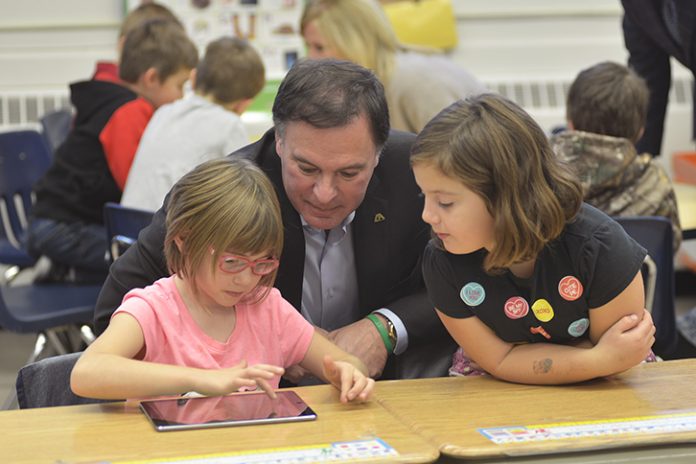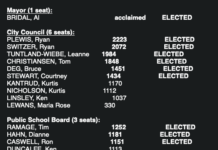
Grade 1 students at O.M. Irwin School had a chance to play with a new Government of Saskatchewan developed math and numeracy skills iPad app.
Students had a chance to view the application Askî’s Pond, an interactive game which compliments Saskatchewan’s Grade 1 math curriculum.
“It was really interesting to watch the kids learn about math and having that technology in front of them to help them learn. They were pretty excited about it. And it was very interesting to see them interact with the technology and learning something that’s pretty important,” explained Deputy Premier and Minister of Education Gordon Wyant who was at O.M. Irwin School for the October 18 unveiling.
Askî’s Pond was first piloted in the spring, and O.M. Irwin students will be using the math assessment in advance the material hopefully rolled out to other schools around the province this school year.
“It’s an interactive tool to help learn. The technology’s all around us and so it’s pretty important,” Wyant said. “It’s using technology to help the children learn. And I think that that’s pretty important because as I say technology’s all around us and we need to embrace it in terms of assisting children in being successful in the classroom.”
O.M. Irwin School Vice Principal Curtis Biem, who had previously worked as a Math Coach for the Chinook School Division, said the new technology is a welcome tool in the classroom.
“What I saw here today was an app that the kids were engaged with, they were able to use independently, the game aspect was motivational. I saw that the math, as I was watching over some of the kids shoulders, was basically exactly what we had worked on with kids over that five years as a Math Coach.”
He said technology like an iPad app does help teachers, but it’s just one aspect of their teaching efforts in the classroom.
“When there’s something that can be a tool to assist them, that’s a good use. But a good app is still just part of a machine, and it doesn’t take the place of a teacher. So it’s a tool in a good teacher’s hand, but if the kids are doing some extra practice on their own, or they’re motivated towards the math, that’s good thing too,” Biem added.
The Help Me Talk About Math interactive iPad game, which builds on the 2014 assessment Help Me Tell My Story, also incorporates First Nations and Metis characters.
Wyant pointed out that Saskatchewan is the first province to introduce treaty education in the classroom, so this focus is beneficial for all students.
“I think that ensuring that our kids understand the history of our province, understand cultural aspects of this province, is pretty important. And so as we’re continuing to develop curricula, as we continue to work on these things in the classroom, ensuring that kids understand the history of this province, the important roll that First Nations have played.”
The entire Help Me Talk About Math assessment includes the iPad game along with a web portal which will be launched in January 2019 to connect teachers with parents and caregivers to access additional learning activities.
Wyant noted existing funding already provided to School Divisions be utilized in providing computer availability in schools.
“There is certainly funding available through the funding model to all the school divisions with respect to enhancing technology within individual schools within school divisions. So we leave it to the school divisions in terms of how those budgets are rolled out. But if we’re going to use technology, if we’re going to embrace it to help the educational experience for children, then we have to be a lot more conscious in terms of how much money is actually dedicated to that tool.”
“I’ll talk to school divisions. I’m going to talk to my ministry about how that’s going to work. Because we need to ensure that with technology, if we’re going to use it – and we need to embrace it to enhance educational outcomes for kids – then we have to make sure that there’s resources for that.”
The provincial government is currently heading into a budget cycle and determining their educational commitments for the coming year. The province restored $30 million in K-12 education as part of the 2018-2019 budget, but that total fell short of the $54 million cut in the previous budget. For the Chinook School Division, the impact of the 2018 budget was approximately $275,000 less than the previous year, and the $75.2 million in grant funding did not address the $6.5 million budget reduction Chinook experienced at the start of the 2017-2018 school year.
“As you know we made a $30 million commitment to enhance educational funding last year, and we’re going to continue to have a conversation with my cabinet and my caucus colleagues with respect to what the budget looks like,” Wyant said of the upcoming spring budget.
“We’ll have more to say about that in terms of what additional commitments we’re going to make to public education when that rolls out,” he added. “These are all investments in education, they’re all investments in our future, and they’re important to make. So we’re going to continue to have a strong voice for enhancing resources in the education sector.”
“It’s one of the reasons we come out to visit schools and visit school boards, and visit local teacher associations, so we can get an idea first hand what the challenges are in the classroom.”





